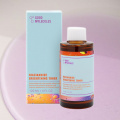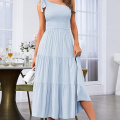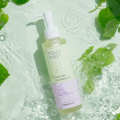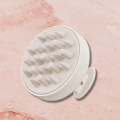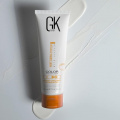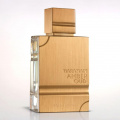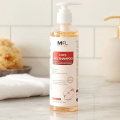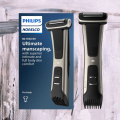Glycerin for Hair: Benefits And Ways to Use for Luscious Tresses
Glycerin for hair acts as a potent humectant, attracts moisture, and provides hydration. Learn how this natural ingredient can nourish and promote hair growth.
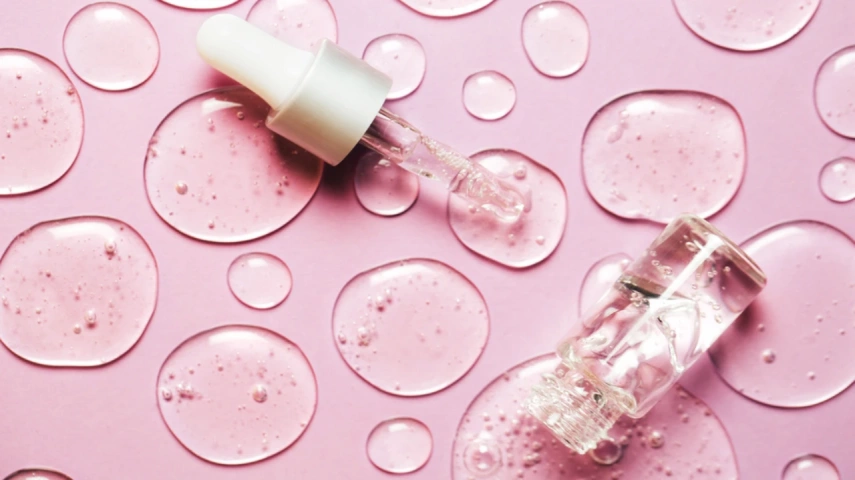
Glycerin is a holy grail ingredient in most of the skincare products. Glycerin for hair may perform similar wonders as it does with your skin. Your hair constantly faces a variety of stressful conditions. From pollutants to chemical irritants, many things take a toll on your hair, which in turn makes hair dry, damaged, and dull. Thankfully, glycerin, a potent humectant, comes to the rescue. Its water-absorbing (hygroscopic) ability made it an inevitable ingredient in most cosmetic products. Moreover, it's a potent natural humectant that aids in hydrating, repairing, and protecting your priceless locks, leaving them renewed, lustrous, and healthy (1).
According to a study, glycerin-packed lotions can help boost scalp hydration and prevent dandruff (2). Hence, using DIY hair masks with glycerol or indulging in glycerin shampoos can help rejuvenate your hair.
Glycerin for Hair: How Does It Work?
Glycerin, being a natural humectant pulls moisture from the air to provide hydration and nourishment to the hair, making it soft and supple. Apart from hydrating the locks, it might also prove to be beneficial in keeping itchiness and dandruff at bay (2).
What Is Glycerin?
Glycerol, glycerine, or glycerin is a simple colorless compound. It is a thick gelatinous liquid that is completely miscible in water (1). This simple compound is a combination of sugars and alcohol that can be obtained in two forms:
- Lab-synthesized glycerin from petroleum
- Natural glycerin extracted from animal or plant sources. Animal-based glycerin is derived from animal fats, whereas vegetable glycerin is produced from vegetable oil like palm oil (2).
This compound is a great humectant, which is widely used in many pharmaceutical products. A humectant attracts moisture from the air and binds it to your skin or hair. Thus, it keeps them well-hydrated and smooth for a long period. Humectants reverse the drying impact of surfactants and assist in moisturizing (3).
As a result, the cosmetics industry makes extensive use of glycerin. From moisturizing body washes, to soaps, and deodorants, everything has glycerin in it. Even your shampoos and conditioners have them as humectants. Additionally, they have antiviral and antibacterial properties (3). Hence, it's widely used to heal burns and open wounds. Now, let’s look at all the benefits surrounding this versatile ingredient in detail.
Benefits of Glycerin for Hair
Glycerin for skin offers moisture and protection from extreme dryness. It makes skin feel softer and look better. It also has the same effect on your hair. Let’s find out the answer to is glycerin good for hair.
Moisturizes And Conditions the Hair
Glycerin's main benefit for hair lies in its ability to attract and retain moisture. It draws moisture from the environment and locks it into the hair shaft and roots (3). This helps to keep the hair hydrated, preventing dryness, frizz, and breakage. Thus regular use of hair products with glycerin can improve the overall moisture balance of the hair. That's why most hair serums and conditioners have glycerin listed on their ingredient label. Using vegetable glycerin for hair can also help add extra shine and luster to your hair and quench the thirst of dehydrated hair.
Prevents Scalp Infections
Hair dandruff - Glycerin penetrates deeply into the scalp and moisturizes it. The skin barrier in the scalp receives strength as well as heals with topical hydration. A scientific study even stated that glycerol-rich leave-on treatments have a significant effect in controlling dandruff (6). It directly improves the quality of the skin barrier on the scalp and thus prevents dandruff. The same study also proved that applying a combination of saturated fatty acids and glycerin can lessen dandruff over the course of eight weeks (6).
It's not just effective against dandruff, but its antimicrobial properties can also help prevent various other scalp infections. These properties also aid in treating itchiness caused by dandruff.
Controls Sebum Production
The major reason your skin generates oil is to coat the hair and scalp in a barrier of protection. Glycerine's moisturizing characteristics lessen the need to coat your scalp in oil. As a result, your scalp constantly produces less oil. Less oil production also ensures less fungal growth. Therefore, glycerin checks sebum production as well as maintains a healthy scalp (7).
Manages Frizziness
Managing frizz and flyaways is one of the most common problems faced by many. Glycerin's moisturizing qualities help to control this frizz by giving the hair the moisture it needs. It also forms a barrier of defense around the hair shaft and stops excessive moisture from penetrating or evaporating from the hair (7). Thus it minimizes frizz and gives hair a smooth and sleek appearance.
Improves Hair Growth
Glycerin moisturizes as well as nourishes the hair. They boost the strength of hair by facilitating moisture content into hair roots (3). They also regulate sebum production and pH balance in the scalp (7). This creates a favorable environment for the growth of hair follicles. This may further promote hair growth and eventually result in longer, and thicker hair. Thus, glycerin for hair growth is a great option.
Below are the pros of using glycerin for hair:
- Moisturizes the hair
- Treats itchy and dry scalp
- Prevents dandruff
- Prevents frizz
- Balances scalp sebum
- Balances scalp pH
- Cheap, common, and effective
How to Use Glycerin for Hair?
To reap the benefits of glycerin for your hair, it's important to use it correctly in permissible amounts (8). Here's a comprehensive guide on how to incorporate glycerin into your hair care routine.
Shampoos And Conditioners
Begin your glycerin hair care journey with a shampoo and conditioner infused with this miracle ingredient. Look for products that specifically mention glycerin in their formulation. They also act as detangling agents in shampoos and conditioners (9).
Gently massage the shampoo into your scalp, allowing the glycerin to penetrate your hair follicles and nourish them from within. Follow up with the conditioner to lock in moisture and seal the cuticles.
Glycerin Hair Masks
For a more intensive treatment, try a DIY hair mask featuring glycerin. Combine diluted glycerin with other natural ingredients like coconut oil, honey, or aloe vera gel, and apply the mixture generously to your hair. Leave it on for at least 30 minutes before rinsing thoroughly. This DIY hair mask will provide an extra dose of hydration and leave your hair feeling luxuriously soft and revitalized.
Aloe Vera And Glycerin for Hair
Glycerin, when combined with aloe vera, has the ability to control excess sebum. Aloe also has anti-inflammatory properties that can relieve scalp irritation (11). Similar to glycerin, it can help retain moisture as well (12).
Prep Time: 2-3 minutes
Ingredients:
- 2 tablespoons aloe vera gel
- 2 tablespoons glycerin
Steps to Follow:
- For this hair mask, mix 2 tablespoons of aloe gel with equal amounts of diluted glycerin.
- Leave it for 30 to 40 minutes and rinse your hair. This is an effective glycerin hair mask to treat damaged hair and boost scalp health.
Honey And Glycerin for Hair
Honey has high fructose and glucose content that can moisturize your scalp along with glycerin (12). It also gives an illusory volume to your hair. Our contributor Kate Ross, a hair and beauty specialist at ‘Irresistible Me’, a hair extension brand, says, “While glycerin itself doesn't straighten hair, it can help in smoothing the hair cuticle and providing a sleeker appearance. It’s not a straightening agent, but it can aid in achieving a smoother look when used as a component in styling products.”
Prep Time: 2-3 minutes
Ingredients:
- 2 tablespoon honey
- 2 tablespoon glycerin
- Oil (optional)
Steps to Follow
- Mix 2 tablespoons of glycerin with 2 tablespoons of honey and apply on the scalp.
- You can also add any light oil like coconut oil to this mixture. This step is optional.
- Leave this mixture for at least 30 minutes to manage dryness and frizz.
Egg And glycerin Hair Mask
Usually, egg whites are only considered to make a hair mask. But the yolk portion also contains high hair growth peptides (13). Thus try this mask to provide some additional nutrition to your hair.
Prep Time: 3-4 minutes
Ingredients:
- 1 egg
- 1 tablespoon castor oil
- 2 tablespoons glycerin
- Apple cider vinegar (optional)
Steps to Follow
- Beat 1 egg with 1 tablespoon of castor oil and 2 tablespoons of glycerine to make a thick mask.
- You can also add apple cider vinegar if you have dandruff or microbes on your scalp.
- Leave this mask for 30 to 40 minutes and wash it off.
Glycerin-Based Hair Spray
You can also make your own hairspray with glycerin. Sprays are easy to use and you can use them as needed on dry or damp hair.
Rosewater And Glycerin for Hair
Rose water's anti-inflammatory and antioxidant qualities aid in calming and relaxing your scalp (14). Additionally, it aids in the fight against stress, which slows the aging of the scalp (15). When combined with glycerin, roe water not only encourages hair growth but also maintains a healthy scalp.
Prep Time: 3-4 minutes
Ingredients:
- ½ cup rosewater
- 2 tablespoons of glycerin
- ¼ cup distilled water
- Essential oil (optional)
Steps to Follow
- First, combine half a cup of rose water and a quarter cup of distilled water.
- Then add 2 tablespoons of glycerin to the mixture.
- You can even add a few drops of essential oil for fragrance (optional).
- Then transfer the ingredients to a spray bottle and use it.
Glycerin + Hair Oil
Glycerin is often diluted with water or a light carrier oil like olive, coconut, or jojoba oil. This is because glycerin in its natural state is quite thick and can make your hair heavy. Thus mix it with something light and less greasy instead of heavy oils like castor oil.
Simple Coconut Oil Hair Mask
Prep Time: 2-3 minutes
Ingredients:
- 2 tablespoons of glycerin
- 2 tablespoons of coconut oil
Steps to Follow
- In a bowl, mix 2 tablespoons each of glycerin and coconut oil.
- Apply this mixture to your hair and scalp and keep it for an hour.
- Use a gentle natural shampoo to wash your hair.
As always, it is advisable that you conduct a patch test to ensure that glycerin suits you before using it. It may have some potential side effects as well. Let’s look at them.
Glycerin And Castor Oil Hair Mask
Castor oil is rich in ricinoleic acid and other fatty acids that penetrate into the scalp to provide ultimate hydration to the scalp. Moreover, these acids help protect hair from fungal and microbial infections (17). On the other hand, it contains neem, which exhibits antifungal effects that help soothe itchy scalps and treat hair concerns related to dandruff. Using this homemade hair mask regularly can help strengthen hair strands and improve your hair health (18).
Prep Time: 2-3 minutes
Ingredients:
- 1 tablespoon of glycerin
- ½ tablespoon of castor oil
- ½ tablespoon of neem powder
- ½ tablespoon of aloe vera gel
Steps to Follow:
- Take a clean bowl and mix glycerin with castor oil and aloe vera gel. Mix well.
- Add neem powder to it and stir well to make a thick paste.
- Apply this mask to your scalp and let it sit for about 40 minutes.
- Rinse it off using a mild shampoo.
Olive Oil, Honey, And Glycerin for Hair Growth
Olive oil, being rich in antioxidants, helps protect the hair from the damaging effects of oxidative stress. Plus, it possesses antifungal properties that help soothe redness, scaling, and pruritus. In addition, it acts as an emollient that locks moisture into the scalp and keeps it moisturized (17).
Prep Time: 2 minutes
Ingredients:
- 1 tablespoon of olive oil
- 1 teaspoon of honey
- ½ tablespoon of olive oil
Steps to Follow:
- In a bowl, mix all the three ingredients to make a smooth paste.
- Apply it from the root to the tip.
- Keep it on your hair for 30 to 40 minutes, then wash the hair pack off using a gentle shampoo.
Types of Glycerin
There are 2 types of glycerin, as mentioned below:
1. Vegetable Glycerin
Glycerin that's derived from oils and fats of natural palm and coconut is known as vegetable glycerin. It has a syrup-like texture and is suitable for both cosmetic and consumption purposes.
2. Animal-based (fat) Protein
In this type of glycerin, animal fat is combined with water and then it is heated on medium to low heat. Then, this mixture is kept overnight in the refrigerator and is boiled to get rid of excess water, after which it is strained to remove dirt and impurities.
Side Effects of Using Glycerin on Hair
While glycerin is generally safe for use, some individuals may experience certain side effects or allergic reactions. Thus always make a patch test when it comes to new ingredients.
Be Cautious While Heat Styling
Applying glycerin to your hair right before using a hair styling tool increases the heat intensity. This could even burn your hair. Likewise, applying glycerin right after heat styling can trap the heat produced by the gadget. This may also break the hair from within. As a matter of fact, glycerine is even used in some heat protectants. Sharing the reason behind the same, our contributor Kate Ross, says, “Glycerin is used in some heat protectants due to its humectant properties—it draws moisture into the hair, which can help protect against the drying effects of heat styling. Keeping hair moisturized is the key to preventing damage.”
Know the Climate!
In dry weather, applying topical glycerin to your hair can make it even drier. Your hair will lose moisture as it dries, and become brittle. Likewise, the opposite occurs on a humid day and your hair may swell up. Thus glycerin is recommended in a region with a moderate level of humidity.
Weighs Down Your Hair
Glycerin is a thick, greasy, and sticky ingredient. Thus it can't be used in its purest form. It has to be diluted with water or light carrier oil. If you apply it without diluting, it may clog pores, trap additional oil, and worsen conditions. Also, avoid applying glycerin on your hair if your scalp is already oily. Or else it may leave your hair heavy and greasy.
Allergic Reactions
Glycerin might not suit everybody, and can cause itchiness, redness, hives, or scalp irritation. Also, if glycerin is not of good quality, it can lead to adverse reactions. Hence, do a patch test before applying glycerin directly to hair to see if it suits you.
Dryness
Glycerin is a humectant, meaning it attracts moisture to keep the skin and scalp hydrated. However, in a low-humidity environment, it can draw moisture away from the hair, leading to dry and frizzy hair.
When to Avoid Glycerin Usage?
Since glycerin is a natural component, you are unlikely to encounter many issues. However, it is important to exercise slight caution while using it, as we just saw the potential side effects. Thus, it is important to know when avoiding glycerin for hair becomes inevitable.
- Avoid glycerin in its purest (thick) form.
- Avoid applying it on open wounds or cuts as it can cause irritation.
- Avoid if you observe rashes or itchiness during the patch test.
Although glycerin is safe to use on hair, one must not use it on cracked or broken skin.
Also, mixing glycerin with water or other oils is important, or else it can make your hair feel very heavy or greasy.
Who Should Avoid Using Glycerin on Hair?
- People who regularly use heat styling tools should refrain from using glycerin, as it may make hair sticky and also damage hair.
- Although there are various uses of glycerin for hair, those living in low humidity environments should refrain from using it. If you live in a dry climate, you should also be wary of using glycerin hair products.
- People allergic to glycerin must avoid using it and read the label before buying anything to avoid possible complications.
When avoiding glycerin, know that it goes by other names too, like glycerol, 1,2,3-propane, glicerol, glycerol monostearate, glycerolum, and glyceryl alcohol. Go through the ingredients list and seek help from a professional before incorporating any new product to your regime to avoid side effects.
Pros And Cons of Using Glycerin for Hair
Owing to its humectant properties, glycerin helps keep the hair nourished and balanced. But just like every coin has two sides, glycerin also comes with both advantages and disadvantages. Here are some pros and cons of using glycerin on hair:
Pros
- Moisturizes hair strands
- Keeps the scalp nourished
- Prevents dandruff
- Strengthens hair cuticle
- Tames frizzy and unruly hair
Cons
- Using glycerin for low-porosity hair is not advisable, as it can lead to a product buildup, causing dandruff and other scalp infections.
- Glycerin might not be suitable for those with fine hair living in high-humidity conditions, as it can draw too much moisture into the hair, making it feel weighed down.
- Although it's rare, glycerin can cause allergies like redness, irritation, or itchiness in people with scalp sensitivities. Hence, if you notice any irritation, discontinue use and seek professional help.
Conclusion
Glycerin for hair is certainly a game-changer in your hair-care routine. It is an essential component of any hair care regimen due to its extraordinary ability to moisturize. This humectant has the capacity to encourage hair development and benefits against environmental damage. Glycerin can also be used to add shine and treat scalp infections. However, under certain circumstances, they can also damage your hair. Perform a patch test before adding any new components to your skin or hair-care regimen. Overall, the benefits of glycerin for hair are great, and worth exploring.
Contributor: Kate Ross, Hair and Beauty Specialist - Irresistible Me
Article Sources
1. Glycol and Glycerin: Pivotal Role in Herbal Industry as Solvent/Co-solvent
2. Synthesis and Characterization of Glycerol From Vegetable Oil
3. Humectant - An Overview
https://www.sciencedirect.com/topics/chemistry/humectant
4. Glycerin-Based Hydrogel for Infection Control
https://www.ncbi.nlm.nih.gov/pmc/articles/PMC3839013/
5. A high glycerol-containing leave-on scalp care treatment to improve dandruff
https://pubmed.ncbi.nlm.nih.gov/25134312/
6. Glycerol Regulates Stratum Corneum Hydration in Sebaceous Gland Deficient (Asebia) Mice
https://www.sciencedirect.com/science/article/pii/S0022202X1530244X
7. Moisture Retention of Glycerin Solutions With Various Concentrations: A Comparative Study
https://www.ncbi.nlm.nih.gov/pmc/articles/PMC9205919/
8. Safety Assessment of Glycerin as Used in Cosmetics
https://pubmed.ncbi.nlm.nih.gov/31840548/
9. Hair Care Composition - Patent
https://patents.google.com/patent/US9107839B1/en
10. Anti-inflammatory and Wound Healing Activities of Aloe littoralis in Rats
https://www.ncbi.nlm.nih.gov/pmc/articles/PMC3501902/
11. The Effect of Aloe Vera Clinical Trials on Prevention and Healing of Skin Wound: A Systematic Review
https://www.ncbi.nlm.nih.gov/pmc/articles/PMC6330525/
12. Honey, a Gift From Nature to Health and Beauty: A Review
https://search.informit.org/doi/abs/10.3316/INFORMIT.675599976696402
13. Naturally Occurring Hair Growth Peptide: Water-Soluble Chicken Egg Yolk Peptides Stimulate Hair Growth Through Induction of Vascular Endothelial Growth Factor Production
https://pubmed.ncbi.nlm.nih.gov/29583066/
14. Skin Anti?Inflammatory Activity of Rose Petal Extract (Rosa Gallica) Through Reduction of MAPK Signaling Pathway
https://www.ncbi.nlm.nih.gov/pmc/articles/PMC6261181/
15. A Rose Extract Protects the Skin Against Stress Mediators: A Potential Role of Olfactory Receptors





 JOIN OUR WHATSAPP CHANNEL
JOIN OUR WHATSAPP CHANNEL




































